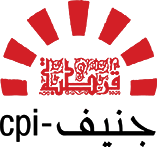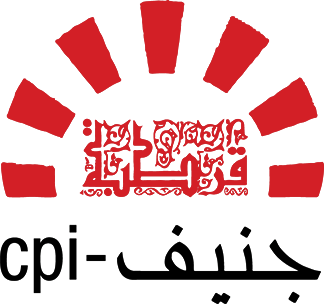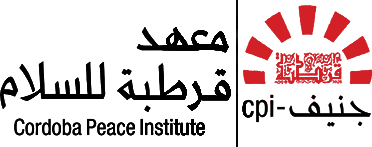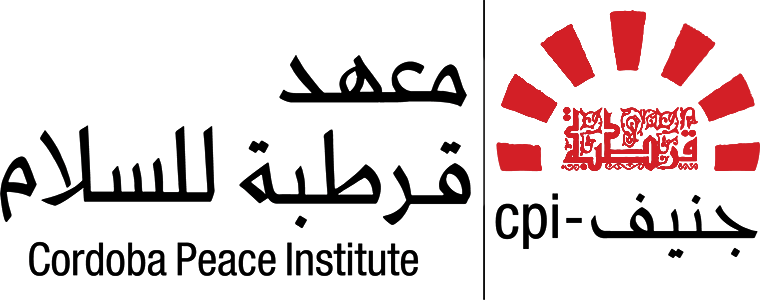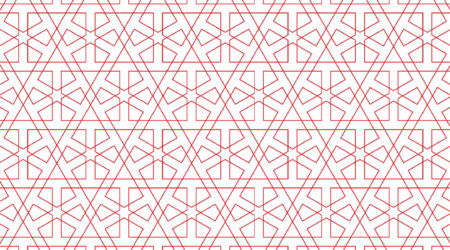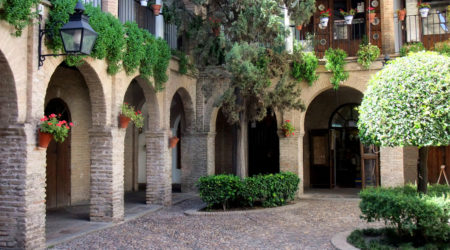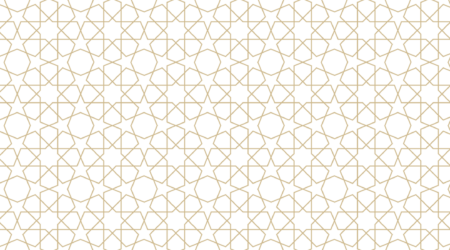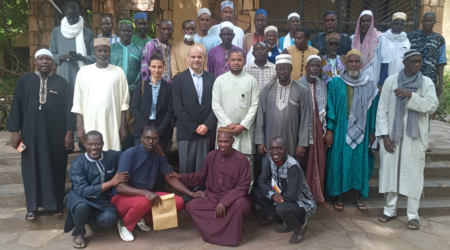The Cordoba Update 13/2016
|
The bi-weekly CORDOBA UPDATE is the product of continuous monitoring work, carried out by the Cordoba Foundation of Geneva team. By analysing and reporting on key events and trends in the Foundation’s areas of interest, we aim to draw readers’ attention to pertinent developments in North Africa, the Sahel, West Asia and Europe, which are not always covered in ‘mainstream’ media. In addition to sharing news from these four regions, the Cordoba Update is an opportunity for the Foundation to provide regular updates on its publications, events and other developments. In line with the programmes and projects funded by partners of the Cordoba Foundation of Geneva, updates and information are included under the following themes:
For questions and/or feedback regarding the content and form of the Cordoba Update, please contact Sarah Franck: sarah.franck@cordoue.ch Le CORDOBA UPDATE est un bimensuel qui présente le travail continu de suivi réalisé par l’équipe de la Fondation Cordoue de Genève. Par l’analyse des événements et tendances qui concernent les domaines d’intérêt de la Fondation, nous visons à attirer l’attention de nos lecteurs sur les développements pertinents en Afrique du Nord, dans le Sahel, en Asie de l’Ouest et en Europe, une actualité qui n’est pas toujours couverte dans les médias dits ‘traditionnels’. Outre le partage de l’actualité de ces quatre régions, le « Cordoba Update » est un moyen pour la Fondation de fournir des mises à jour régulières sur ses publications, événements et autres développements. En accord avec les programmes et projets financés par les partenaires de la Fondation Cordoue de Genève, les mises à jour et informations concernent les thèmes suivants :
Pour des questions et / ou des commentaires concernant le contenu et la forme du Cordoba Update, veuillez contacter Sarah Franck : sarah.franck@cordoue.ch |
ISLAMIST-SECULAR RELATIONS / RELATIONS ENTRE SÉCULIERS ET ISLAMISTES
Morocco, 16.06.2016: Abdelilah Benkirane Affirms the Civil and Political Nature of the PJD
In a speech given at congress, Morocco’s Prime Minister Abdelilah Benkirane has spoken out against the ruling party’s main competition in the upcoming national elections, the royal palace-backed opposition party, the Party of Authenticity and Modernity (PAM). He stated that “PAM’s political project has failed despite the fact that it is backed by some media,” and furthermore emphasised that the Party of Justice and Development (PJD), is a civil and political party “which is far from the religious Islamism.”
One source noted that this speech was a significant change to the rhetoric of PJD leaders in the past, many of whom espoused a return to “Islamic laws” in order to solve the country’s current problems. However, the party, and its members, have adapted themselves to complex political realities, notably abandoning their desired “moral reforms” and instead championing certain economic and social reforms. These have resulted in some protest against the government in recent months, with some groups levelling the criticism that the PJD has failed to engage in a social dialogue over citizens’ concerns for certain legislative alterations (see the Cordoba Update 2/2016 and 7/2016).
Four months ahead of parliamentary elections, the PJD has voted to prolong Prime Minister Abdelilah Benkirane’s tenure as secretary general. Some commentators have speculated that this move means that the party expects Benkirane’s legitimacy to play a decisive role in the national elections.
In addition, the PJD and numerous other political parties voted to postpone their ordinary congresses until after Moroccans go to the polls. According to some sources, the PJD sees PAM as its primary rival in the upcoming elections because the establishment party won more regions than the ruling party in the country’s first regional elections, in 2015.
In the upcoming parliamentary elections however, the PJD is banking on Benkirane’s popularity to see them through to a second, consecutive win.
Links for more information:
https://www.youtube.com/watch?v=eYBVi2W33Zw
http://www.middleeasteye.net/columns/will-moroccos-benkirane
http://www.medias24.com/NATION/POLITIQUE/162653-Abdelilah-Benkirane
http://lematin.ma/journal/2016/le-pjd-reporte-la-tenue-de-son-congres
http://www.maghrebemergent.com/economie/maroc/60132-maroc-a-quatre-mois
TRANSITION AND POLITICAL PARTICIPATION / TRANSITION ET PARTICIPATION POLITIQUE
Egypt, 21.06.2016: Court of Egypt Rejects Transfer of Islands to Saudi Arabia
In a rare display of rebellion against Abdel Fatah al-Sisi, a Cairo court voted to annul his decision to transfer sovereignty of two islands to Saudi Arabia. Judge Yehia el-Dakroury declared that Egypt’s maritime border would not be redrawn, meaning that the islands of Tiran and Sanafir will remain under Egyptian sovereignty.
In April 2016, Sisi awarded the two islands to Saudi Arabia in a highly controversial deal during a visit to Egypt by King Salman, which also coincided with the signing of oil deals and development packages from the Gulf kingdom. Sisi’s government, together with loyal media, has zealously defended the April agreement, arguing that it would bring economic benefits to Egypt. It says the islands were only placed under Egyptian control in 1950 for protection from Israel, which briefly occupied them six years later during the Suez crisis. On April 9, the Egyptian cabinet declared that the agreement came “after hard work that lasted a long six years, during which time 11 rounds of meetings were held with the maritime delimitation committee between [Saudi Arabia and Egypt].”
On 26 June 2016, the Supreme Administrative Court adjourned to July 3 the government’s appeal against last week’s verdict to nullify a border demarcation agreement between Egypt and Saudi Arabia that was made in April. A different circuit within the court will consider whether to recuse the judges who presided over the case filed against the border agreement by lawyer and former presidential hopeful, Khaled Ali and his team.
Omar Rafeq, the deputy head of the State Lawsuits Authority (who represent the government in legal cases) presented the court with 22 documents to support the case for the islands belonging to Saudi Arabia. Among the documents were letters exchanged between Egypt and Saudi Arabia, in which the latter asked Cairo to take responsibility for protecting Tiran and Sanafir. Foreign Minister Sameh Shoukry said on 14 June 2016 that parliament has the right to reject the transfer of sovereignty of the Tiran and Sanafir islands to Saudi Arabia, stressing that the agreement would be “as if it never happened” should parliament veto it.
Meanwhile, a judicial decision delivered has worsened Egypt’s relationship with Qatar and hurt the country’s reputation for press freedom. The final verdict in a high-profile trial of 11 people for espionage was finally handed down by a Cairo court on 18 June, with six people sentenced to death. It confirms the death sentence for six of the defendants, including two staff members of Qatar-based broadcaster Al Jazeera. Egypt’s former president Mohamed Morsi was sentenced to life imprisonment, along with aides Ahmed Abdel Aaty and Amin al-Serafy.
Links for more information:
https://www.washingtonpost.com/world/middle_east/egyptian-court-rejects
https://www.theguardian.com/world/2016/jun/21/egyptian-court-quashes
http://www.dailynewsegypt.com/2016/06/15/shoukry-addresses-youth-islands
http://www.theafricareport.com/North-Africa/egypt-court-decision-a-political-case
http://egyptianstreets.com/2016/06/21/egypt-administrative-court-annuls-transfer
Libya, 16-28.06.2016: Shifting Alliances in Libya’s Conflict
The main development in Libya’s stalemate over the last three weeks has been the offensive against the so-called “Islamic State” group in Sirte led (officially) by forces under the command of Faize Serraj’s Presidency Council. Reports from the field indicate that Islamic State militia are besieged in a 5 km sq area and have suffered significant losses.
On the frontline, it is in fact Misratan militia (Hatin and Al-Marsa) that have spearheaded the offensive, helped by airstrikes from aircraft using an air base in Misrata. Despite Serraj’s instructions to stop 60 km before Sirte, the Misratans stormed ahead and delivered advances against Islamic State in a remarkably a short time. The Misratans are determined to defeat Islamic State in Sirte because it represents a security threat to their home town, which is immediately west of Sirte. The significant Misratan advances in Sirte were soon reclaimed by Serraj, who admitted that the offensive was supported logistically by foreign military advisers.
On the eastern front, Benghazi Revolutionary militants have scored significant advances, taking control of parts of Jdabia to the detriment of Khalifa Hafter’s forces. Hafter’s troubles were complicated further by a shifting of alliances within his camp. First, Al-Awaguir tribe (a strong ally to Hafter and a main source of combatants) held a tribal council meeting in which they discussed reports of assassinations of Awaguir tribe figures, reportedly masterminded by Hafter’s men. The revelation led to a sort of split within the tribe; between those who are calling for an end to the alliance with Hafter and those who think doing so could have negative consequences on the tribe. Those in favour of ending the alliance with Hafter argue that Al-Awaguir tribe gained nothing from the alliance, while Al-Maghariba tribe control oil terminals, Al-Bara’sa tribe control the Tobruk-based government, and the Al-Abidaat control the House of Representatives (HoR).
Second, in a statement to a Libyan TV station, Ibrahim Djadhran (whose loyal forces control oil terminals in Jdabia) pledged to fight Hafter should his forces attempt to re-take Jdabia. Third, these developments come at a time when Aguila Saleh, president of the HoR, appointed Abderazak Nadhori, military commander of the zone stretching from Derna to Beni Jwad. This move has been decoded as a fallout between Saleh and Hafter. The latter flew to Cairo late last week and then arrived in Moscow on Sunday 26 June.
Politically, there have been reports of a mediation underway by Saudi Arabia, due to kick off at the end of the Ramadan, on 5 June. Reportedly, a delegation of Libyan tribal leaders will visit Riyadh after Ramadan, while a group of religious scholars will pay a visit to Sadek Gharyani, the Grand Mufti of Libya. Given this, Aguila Saleh’s arrival in Oman on Saturday 25 June was reportedly part of this Saudi mediation, some sources believe.
Links for more information:
https://www.libyaherald.com/2016/06/27/ageela-saleh-visits-oman
http://www.marsad.ly/en/2016/06/23/uk-troops-operating-french-led-libyan
http://video.akhbar-libya.ly/c1st87tp83df (Ibrahim Djadhran statement)
http://video.akhbar-libya.ly/rwguc2n1djic (Faraj Aguaim: Al-Awaguir tribe council meeting)
http://arabi21.com/story/915358
Mali, le 23.06.2016 : Nord du Mali : la présidence nomme son représentant pour l’application de l’accord d’Alger
Le gouvernement malien vient de désigner un nouveau haut représentant du président de la République du Mali pour l’application de l’accord d’Alger. Ce haut fonctionnaire qui a le statut de ministre ne siégeant pas en conseil des ministres sera la pièce maîtresse dans l’application de l’accord signé il y a un an à Alger entre le gouvernement malien et les différentes autres parties à la crise que connaît le pays depuis 2012. L’intéressé, Mahamadou Diagouraga est connu pour avoir été l’un des acteurs de premier plan dans les précédentes crises du nord du pays dans les années 90. Il serait une personnalité consensuelle, respectée aussi bien au sud qu’au nord du pays.
Ancien commissaire au Nord (dans les années 90), Mahamadou Diagouraga était le principal interlocuteur des groupes armés pour le retour de la paix. A la résurgence de la rébellion touarègue en 2006, il est rappelé aux affaires et installé à Kidal à la tête de la commission du suivi de l’accord d’Alger. Inspecteur général de police, il était jusque-là ambassadeur du Mali en Mauritanie. A partir de ce pays, il avait entretenu des rapports très apaisés avec les responsables des groupes armés installés dans ce pays. A plusieurs reprises, il s’était investi pour convaincre les uns et les autres d’accepter d’aller aux différentes rencontres pour la paix dans le nord du pays. A ce titre, sa nomination est plutôt très bien accueillie par les groupes armés. Elle est également saluée dans le milieu diplomatique aussi bien à Nouakchott qu’à Bamako. L’homme entretiendrait aussi d’excellentes relations avec l’Algérie avec laquelle il avait eu à travailler étroitement dans le cadre des différents processus de normalisation de la situation au nord de son pays.
Liens pour plus d’informations :
http://www.cridem.org/C_Info.php?article=685932
RELATIONS BETWEEN COMMUNITIES OF DIFFERENT ETHNIC, CULTURAL AND RELIGIOUS AFFILIATIONS /
RELATIONS ENTRE COMMUNAUTÉS DE DIFFÉRENTES AFFILIATIONS ETHNIQUES, CULTURELLES ET RELIGIEUSES
Mali, 20.06.2016: Naissance d’un nouveau mouvement armé d’obédience peulhe
Le 18 juin, un nouveau groupe armé, l’Alliance nationale pour la sauvegarde de l’identité peule et la restauration de la justice (ANSIPRJ), a vu le jour au centre du Mali. Se fixant comme objectifs, entre autres, l’autodéfense des peulhs, il est dirigé par un instituteur, Oumar Aldjana, jusque-là inconnu du grand public. Aldjana qui commanderait environ 700 hommes affirme vouloir mettre fin aux exactions contre les peulhes qui sont « victimes d’amalgame de la part des militaires maliens et français ».
Selon des sources de presse maliennes, le mouvement serait soutenu par des associations politiques et culturelles locales. Il bénéficierait aussi de la sympathie de la diaspora peulhe, notamment dans les pays voisins et en Europe. Les mêmes sources affirment que Aldjana serait actuellement en Mauritanie où il aurait été reçu en haut lieu.
S’estimant toujours pris entre deux feux depuis le déclenchement des troubles sécuritaires et le début des opérations militaires au nord Mali, les populations Peulhes de la zone centre et ouest du Mali accusent aussi bien les mouvements violents à connotation religieuse (AQMI, MUJAO et Ançar Dine) et indépendantistes (MNLA) que les armées malienne et française de les cibler systématiquement. Selon Aldjana, les premiers accusent les peulhs d’être pro-Bamako et n’hésitent pas à se servir de leurs troupeaux pour nourrir leurs troupes. Les seconds, qui les taxent d’être pro-mouvements insurgés et séparatistes, s’en prennent aux jeunes Peulhs qui sont malmenés, arbitrairement arrêtés et souvent tués.
De prime à bord, les observateurs s’interrogent sur la représentativité, donc la légitimité dont jouit ce mouvement pour parler au nom des Peulhs du mali. Selon un membre actif de l’une des plus grandes associations culturelles peulhes du pays « Tabital Pulaagu » (Promotion de la culture peulhe), « Prendre les armes n’est jamais la solution à un problème sociopolitique ou identitaire. Face aux exactions dont nos frères et sœurs sont victimes dans la zone de Douentza, Ténenkou, Youwarou…, nous avons tiré la sonnette d’alarme. Après une période d’indifférence, le gouvernement a positivement réagi en manifestant sa détermination à faire la lumière sur la situation. C’est la meilleure approche à mes yeux ». Il ajoute, « une personne ou une communauté ne peut pas prendre des armes pour représenter tous les peuls du Mali ».
Un autre cadre peulh installé à Bamako affirme à la presse : « Tout ce que dit Oumar Aldjannah est faux. Il a d’autres motivations personnelles que de défendre les peulhs. ANSIPRJ est comme le MNLA. Elle ne représente ni les peuls ni une autre ethnie. Elle veut juste créer la panique au sein de la population pour profiter de la confusion ou des dividendes de la paix ».
De sa part, un observateur de la situation au Mali commente : «la création de cette milice d’auto-défense va compliquer la lutte contre le terrorisme au Mali, d’autant plus que c’est un autre ennemi qui va occuper les forces armées et de sécurité du pays déjà engagées sur plusieurs fronts ». Pour un expert militaire « de nombreux observateurs parient que, ne pouvant pas engager des combats directs, cette milice ne pourra que procéder à une guerre asymétrique, c’est-à-dire des embuscades et des attentats contre les forces de sécurité ».
Pour le moment, beaucoup d’ombres entourent ce mouvement. Cependant, force est de constater que l’ethnisation de la violence au nord Mali par son extension à des segments de la communauté peulhe du pays (déjà impliquée dans le Front de libération du Macina) constitue un nouveau facteur de déstabilisation, non seulement pour le Mali, mais aussi pour toute la bande sahélo-saharienne et pour l’Afrique de l’ouest et centrale. Présente dans 18 pays africains (de la Mauritanie au Soudan), la communauté peulhe (Fulani) pourrait, par un appel d’air grégaire, alimenter les conflits en cours sous le prétexte de défendre les consanguins au Mali ; ce qui ouvrirait la boîte à pandore dans une zone déjà lourdement affectée par les dissensions inter-ethniques et la violence.
Liens pour plus d’informations :
http://malijet.com/a_la_une_du_mali/159554
http://www.cridem.org/C_Info.php?article=686051
http://malijet.com/la_societe_malienne_aujourdhui/interview_mali/159573
http://malijet.com/actualte_dans_les_regions_du_mali/rebellion_au_nord_du_mali/159571
Gulf Region and Middle East, 13 – 26 June 2016: Political Crackdown on Opposition in the Gulf Region has Regional Consequences
On 14 June, Bahrain’s government suspended all activities of the country’s main opposition group, Al-Wefaq, pending a verdict on dissolving it entirely. This decision was announced a day after a leading human rights activist, Nabeel Rajab, head of the Bahrain Center for Human Rights was arrested on charges of “spreading false information.” Rajab could face up to 13 years in prison.
The announcement of Al-Wefaq’s closure was posted on the Bahrain News Agency, the official news outlet of the Kingdom. It highlighted that:
The Ministry of Justice, Islamic Affairs and Endowments emphasized the dangers of (…) organizations which operate within the framework of external religious political reference, under the apparent disregard to the duties of citizenship and peaceful coexistence, and a direct dependence on the deepening sectarian political concepts…
The announcement reflects government concern with Al-Wefaq’s support from the Shia majority in the small kingdom; it is notable that the government describes this community’s religious and cultural reference as “external,” perhaps implying that it is a foreign presence in the country. Al-Wefaq was further accused of offering support for “terrorism, radicalisation, and violence” and opening the way for “foreign interference” in the kingdom’s affairs.
One week later, the Bahraini government followed up on this decision by revoking the citizenship of Sheikh Issa Qassim: the spiritual leader of the Shia population of the country and a lead figure of Al-Wefaq. The interior ministry announced that Sheikh Qassim had used his position to “serve foreign interests and promote… sectarianism and violence.” Some observers have speculated that this latest crackdown on Bahraini opposition preludes an “unpopular economic announcement” for the population.
In recent months, the Bahraini authorities have revoked the nationalities of numerous Bahraini Shias convicted of violence, in addition to expelling foreign nationals with similar religious identities (see the Cordoba Update 6/2016). However, unlike earlier cases, the decision against Qassim was issued by the council of ministers and not by a court, demonstrating the close involvement of the ruling family’s appointed officials in this decision. According to some sources, 260 Bahraini citizens have had their nationalities revoked since 2012.
The decisions taken by the Bahraini government have had repercussions far beyond the country’s borders, and the denaturalisation of Sheikh Qassim received condemnation from many quarters. As well as critical statements from the US State Department and numerous international organisations, the decision was also addressed in a rare political statement from the head of Iran’s Islamic Revolutionary Guard Corps (IRGC) Quds Force, Qasem Soleimani. Speaking of Bahrain’s ruling family, Soleimani said that “they certainly know that trespassing the sanctuary of Ayatollah Sheikh Issa Qassim is a red line whose crossing will set fire to Bahrain and the region and will leave people with no path but armed resistance.” Soleimani’s analysis suggests that the Bahraini government’s move is a turning-point in the relations between alienated citizens and their rulers in the Gulf region, and perhaps further afield.
In addition to the head of the IRGC, Hezbollah, and Iraqi groups including Hadi al-Amiri (head of the Iran-backed Badr organisation), Qais Khazali (head of the Iran-backed League of the Righteous militia, one of the most extreme and best connected of the unofficial Shiite Muslim militias currently fighting in Iraq) and supporters of Muqtada al-Sadr (see past Cordoba Updates) expressed similar condemnation of the Bahraini ruling family and its government. The actions of the Bahraini government and the reactions expressing solidarity with Sheikh Qassim and with Bahrain’s Shia population more generally, may result in an inflammation of the situation in the region, at the expense of national cohesion.
Elsewhere in the Gulf, similar instances of social and political unrest have been seen in recent weeks. Saudi Arabia has seen some violence in the eastern provinces, where a police officer was killed on 24 June, just two days after a man who was wanted by Saudi authorities was killed in a security forces raid on his home. In addition, the Kuwaiti parliamentarian, Abdul Hamid Dashti (who is described as “an outspoken critic of Saudi Arabia’s involvement in Yemen and Bahrain”) has been sentenced to jail on charges of defamation submitted against him by the Saudi Arabian embassy in Kuwait.
In the current, tense regional climate, developments such as those in Bahrain could signal a sharp increase in violence in diverse communities – both aimed at the ruling regimes and at other sections of the population.
Links for more information:
https://www.alaraby.co.uk/english/news/2016/6/14/bahrain
https://www.alaraby.co.uk/english/news/2016/6/26/bahraini-rights-activist
http://www.bna.bh/portal/en/news/732195
https://www.alaraby.co.uk/english/news/2016/6/20/bahrain-strips-citizenship
http://www.alwasatnews.com/news/1128854
http://www.cordoue.ch/the-cordoba-update/item/426
http://www.al-monitor.com/pulse/originals/2016/06/soleimani-bahrain
http://www.presstv.ir/Detail/2016/06/25/472037/Iraq-Bahrain-Sheikh
http://arabi21.com/story/915841/
https://www.alaraby.co.uk/english/news/2016/6/25/police-officer-shot
https://www.alaraby.co.uk/english/news/2016/6/19/kuwaiti-lawmaker
Union Européenne (UE), 27.06.16: Après le vote pro-Brexit, l’UE arrivera-t-elle à se réformer et à remettre l’humain au centre de sa politique ?
Le Brexit vient chambouler voire dramatiquement transformer la structure européenne, alors que le contexte semblait déjà peu favorable à l’équilibre et à la stabilité européenne. Ce nouveau coup dur vient donc rejouer les cartes de l’avenir européen qui, semble-t-il, tendrait à plus de populisme et de replis sur soi. En effet, à l’issue de ce vote, certains partis nationalistes, dont le Front National de Marine Le Pen, ont appelé à des référendums nationaux afin de remettre en question l’appartenance à l’Union Européenne de leurs pays respectifs.
Pour la BBC, c’est le rôle de meneur qu’aurait joué l’Allemagne ces dernières années et notamment son positionnement vis-à-vis du conflit en Ukraine et vis-à-vis de la crise migratoire, qui aurait inquiété Outre-Manche.
De plus, la rhétorique anti-immigrant sur laquelle les partisans du Brexit ont joué durant la campagne semble avoir eu une influence significative. Cela a notamment poussé le quotidien The Guardian a mener une enquête d’opinion afin de recueillir les témoignages des immigrés au Royaume-Unis et leur sentiment vis-à-vis du vote pro-Brexit.
Sur un plan international, le désengagement britannique de l’Union Européenne risque d’avoir un impact conséquent sur les projets humanitaires et sécuritaires en Afrique. En effet, de nombreux projets de développement britannique sont directement financés par le Fond Européen de Développement (FED) et il n’a pas encore été décidé de réallouer ces fonds auprès du Département britannique pour le développement international. Cette dynamique de désengagement tendrait à fragiliser des projets européens qui, justement, visent dans le long terme à contenir les flux de réfugiés. Par exemple, l’Initiative pour la route migratoire UE-Corne de l’Afrique.
La fragilité de l’UE se fait également ressentir dans le processus de mise en œuvre de l’accord UE-Turquie de mars dernier. Il semblerait en effet que la politique européenne en matière de respect des droits de l’homme et des libertés individuelle ne fasse pas autorité sur les décisions actuelles prises par Ankara en la matière. En effet, trois journalistes Sebnem Korur Fincanci, Erol Onderoglu, et Ahmet Nesinde accusés de « propagandes terroriste » ont été placés le 20 juin dernier en détention préventive. Il semblerait donc que le gouvernement turc ne tienne pas compte des pressions européennes en matière de respect de la liberté d’expression et de la presse. Pourtant, le respect du critère 65 (/72) est une condition nécessaire de la politique de libéralisation des visas pour ressortissants turcs (pour plus d’informations : « Turkey’s progress on the visa liberalisation roadmap » et le Cordoba Update 8/2016).
Comme le souligne Foreign Policy dans son article « It’s Time for Europe to Walk Away From Its Refugee Deal With Turkey », le système européen dans son ensemble et vis-à-vis de la question des réfugiés, doit être réformé. Selon l’auteur de cet article Nate Schenkkan, les nouvelles arrestations de journalistes qui ont eu lieu en Turquie devrait être une occasion pour l’Europe de se rétracter vis-à-vis de l’accord, ce qui pourrait permettre la mise en place de mécanismes plus adaptés, plus pratiques et plus humains (pour plus d’informations sur ces alternatives : le Cordoba Update 11/2016 et 12/2016).
Enfin, afin de prévenir une désintégration de l’UE, fragilisée de toutes parts, le ministre français de l’économie, Emanuel Macron, a plaidé pour un débat démocratique autour de l’avenir de l’Union. Selon lui en effet « un projet de refondation, ça doit se construire avec les gens ». Il a en outre plaidé pour une « consultation transeuropéenne », afin d’éviter un éventuel effet de contagion et la mise en place de 27 référendums européens différents. Il a aussi souligné que la question de Calais se posait à nouveau et qu’elle devra donc être « immanquablement rediscutée ».
Liens pour plus d’informations :
http://www.bbc.com/news/uk-politics-eu-referendum
http://foreignpolicy.com/2016/06/26/its-time-for-europe-to-walk-away
https://www.hrw.org/news/2016/04/08/eu-asylum-proposals
http://www.al-monitor.com/pulse/originals/2016/06/turkey-european-union
http://www.liberation.fr/planete/2016/06/26/l-ue-en-desordre-de-bataille
http://www.theguardian.com/politics/2016/jun/26/brexit-intolerance-ethnic
http://ec.europa.eu/dgs/home-affairs/what-we-do/policies/european-agenda-migration
http://www.cordoue.ch/the-cordoba-update/item/428
http://foreignpolicy.com/2016/06/27/brexit-is-bad-news-for-africa-period
http://www.cordoue.ch/the-cordoba-update
http://www.lefigaro.fr/politique/le-scan/2016/06/25/25001
VIOLENT EXTREMISM AND THE WAR ON TERROR / EXTRÉMISME VIOLENT ET LA GUERRE CONTRE LA TERREUR
USA, 16-17.06.2016: CIA Interrogation Program and the War on Terror.
The Central Intelligence Agency (CIA) released dozens of previously classified documents that expose disturbing new details of the agency’s treatment of terrorism suspects after the Sept. 11, 2001 attacks, including one who died in Afghanistan in 2002 after being doused with water and chained to a concrete floor as temperatures plunged below freezing. The voices of former detainees tortured by the CIA at secret overseas prisons are revealed in newly declassified transcripts of hearings held at Guantanamo Bay, Cuba, after the men were transferred there in 2006. In the case of Zayn al-Abidin Muhammed Hussein, a Saudi-born Palestinian better known as Abu Zubaida (who was arrested in 2002 and is still held at the U.S. military prison at Guantanamo Bay, CIA), interrogators supposedly apologized to him after the agency realized it had overestimated his role in al-Qaeda. The CIA believed he was a senior figure in the terrorist organization when he was, in fact, a kind of fixer in Pakistan, who helped people travel to training camps in Afghanistan.
Meanwhile, the head of the CIA offered a sobering view of the so-called “Islamic State” group’s capabilities, saying that despite setbacks the jihadist group will likely intensify its global terrorist campaign in the months ahead. CIA director John Brennan, in testimony before the Senate Intelligence Committee, said the “Islamic State” (also known as ISIL and ISIS) remains a potent force in Iraq and Syria and remains capable of striking countries far from its base in the Middle East, nearly two years after the start of the U.S.-led military campaign aimed at defeating the group.
Finally, more than 50 State Department diplomats have signed an internal memo sharply critical of the Obama administration’s policy in Syria, urging the United States to carry out military strikes against the government of President Bashar al-Assad to stop its persistent violations of a cease-fire in the country’s five-year-old civil war. The memo, a draft of which was provided to The New York Times by a State Department official, says American policy has been “overwhelmed” by the unrelenting violence in Syria. It calls for “a judicious use of stand-off and air weapons, which would undergird and drive a more focused and hard-nosed U.S.-led diplomatic process.”
Links for more information:
https://www.washingtonpost.com/world/national-security/newly-released-cia-files
https://www.washingtonpost.com/news/checkpoint/wp/2016/06/16/i-nearly-died
https://www.washingtonpost.com/news/checkpoint/wp/2016/06/16/cia-director-isis
http://www.nytimes.com/2016/06/17/world/middleeast/syria-assad-obama
http://www.nytimes.com/interactive/2016/06/17/world/middleeast/document-state
THE CORDOBA FOUNDATION OF GENEVA IN THE MEDIA
La Fondation Hirondelle, juin 2016 : Des « espaces de médiation protégés » pour la paix
« Le directeur de la Fondation Cordoue de Genève, expose le travail de cette institution pour promouvoir l’échange entre cultures et religions et pour encourager la recherche et le débat sur la paix dans le monde » dans Quoi de Neuf ? – la publication trimestrielle de la Fondation Hirondelle.
Lien pour plus d’informations :
http://www.hirondelle.org/images/pdf/QDN/QDN-48-F.pdf
GENERAL INFORMATION
The Cordoba Update will be taking a break over the coming weeks. We send our best wishes to all our readers for Eid al-Fitr, and we look forward to being with you again in August.
The views and perspectives contained in the Weekly Update are from individual contributors and external sources, and do not necessarily reflect the opinions or position of the Cordoba Foundation of Geneva. The links are neither intended as an endorsement of particular publications nor the only source for the updates, but to connect to information in the public domain, for those interested in background or further details.
